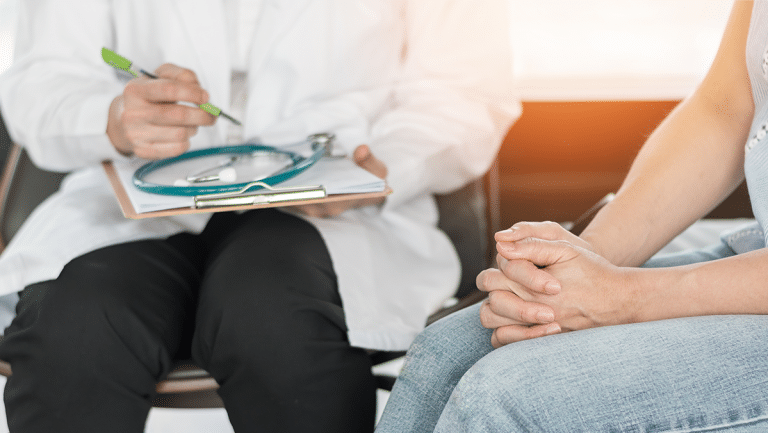As women progress through menopause, they may notice that their libido changes. For some women, libido may increase, while others may decrease. Most commonly, as hormone levels begin to decrease during menopause, so will libido. Menopause. Hot flashes, night sweats, sleep disruption, fatigue, and mood changes. Menopause can be a mood killer and it surely can make any woman feel less than sexy. In fact, up to 40% of women lose the desire for intimacy during menopause. On top of the menopause symptoms, intimacy simply isn’t on your mind as much as it used to be, leaving you out of touch with yourself and your partner.
Causes Of Low Libido In Menopausal Women
Women may experience low libido during menopause for a number of reasons. This can be due to the obvious shift in hormone levels, paired with stress, relationship strains, physical illness, medication, and others factors.
In the symptomatic population of surgically or naturally menopausal women, a low level of free testosterone often accompanies a complaint of reduced sexual desire. Testosterone is often referred to as “the hormone of libido,” because it plays a significant role in your sex drive, whether you’re a man or a woman. Proper levels of testosterone have many benefits for your libido, including sexual desire, energy, mood, improved erection, and increased genitalia sensitivity.
A study done by researchers in the Netherlands on healthy, premenstrual women showed that sublingual testosterone triggered a significant increase in genital arousal, along with an increase in sexual desire. They also noted that there is a lag period of 4.5 hours after taking the testosterone before sexual sensations soar. This may be because steroid hormones cause neurophysiological alterations in the sensory centers of the brain – a process that can take several hours to several days. They also noted that measurable vaginal arousal increased steadily over the 4.5 hour period.
Although testosterone is the key hormone when addressing a decreased libido, estrogen and progesterone are equally important, since they can affect testosterone levels. Inadequate estrogen levels in women can reduce the effectiveness and efficiency of testosterone, and too much estrogen in men can have the same effect. Estrogen and progesterone also have an effect on libido, especially in women; physical changes like vaginal dryness, vaginal atrophy, and painful uterine contractions are all related to abnormal levels of these two hormones.
The drop in estrogen and testosterone levels during menopause can lead to depression, mood swings, weight gain, and hot flashes.
Other factors that may influence a woman’s interest in sexual activity during menopause and after include: bladder control problems, sleep disturbances, depression or anxiety, stress, medications, and health concerns. Additional changes that women go through during menopause can potentially negatively affect libido. These can include weight gain which can cause women to feel less comfortable in their body, alongside fatigue, ultimately decreasing overall desire for intimacy.
How Can You Boost Your Libido During Menopause?
Balance Your Hormones. The use of bioidentical hormones, hormones that are exact copies of hormones naturally produced by the body, can be very effective in returning sex drive. Estrogen may aid in the reduction of menopause symptoms and ultimately improve sex drive.
Additionally, Oxytocin can be prescribed by a physician to safely boost libido before intercourse. Supplementation of testosterone to more youthful levels can dramatically increase libido, sense of well-being, energy, and quality of life.
Thyroid health is important for a healthy libido as well, so adequate thyroid testing and treatment is a major component for improving your sexual function. In a 2011 study in the Journal of Thyroid Research it states that there is evidence that “estrogen may have direct actions in human thyroid cells.”

Consider Over-the-Counter Products. Women might find relief in using water-based lubricants during intercourse. Talk to your doctor about which product is best for you to find relief from your symptoms.
Exercise. Physical activity has a number of benefits for both physical and mental health. Try incorporating 30 minutes of activity into your day-to-day routine. Along with increasing physical activity, introducing healthy food choices can also positively affect your overall well-being.
Consider a Menopause Diet: As a woman enters and progresses through menopause, the nutritional demands of the body can change dramatically. As such, it is important to respond with an appropriate diet plan. The primary goal of a menopause diet is to provide the nutrition needed to normalize and maintain healthy function while eliminating substances that contribute to hormonal imbalances, inflammation, and other disruption. Making appropriate dietary changes such as consuming healthy fats and phytoestrogens can help alleviate menopause symptoms and support your libido.
Prioritize sleep: A lack of sleep can elevate cortisol levels, which also leads to low libido. Getting a full eight hours of sleep every night can help avoid cortisol compromising your libido as well as promote the health of your endocrine system.
Do Your Kegels. Keep your vaginal tone intact by doing daily Kegel exercises. Squeeze and release the muscle you use to control your urine flow. Do it in small, quick motions, and then mix that with long, extended contractions.
Improve Your Physical Intimacy. During menopause, if your sex drive has declined but you don’t think you need counseling, you should still take time for intimacy with your partner. Love and affection can be expressed without intercourse. Enjoy your time together by taking walks, eating dinner by candlelight, or giving each other sensual massages.
If you are concerned about your libido, call our office at 877-508-1177 to book an appointment with a Holtorf Medical Group provider today.

